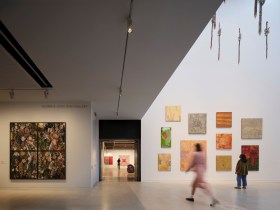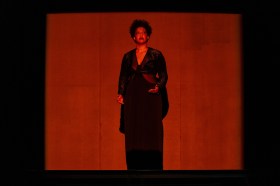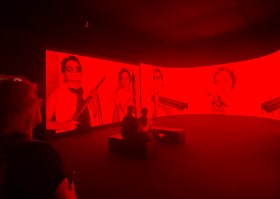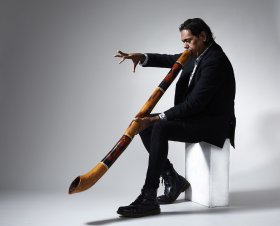Image via www.quotationof.com
An ear for dialogue, the abilities to tell a compelling story, create complex characters, explore new plots and narratives, and write scripts which enthral the reader as well as helping them imagine what a staged production of the work might resemble – there are numerous skills required by the successful playwright. The ability to meet a pressing deadline is another – but how does one get started in this particular field?
For Joanna Murray-Smith, whose plays include Honour, Bombshells and the current MTC/STC production Switzerland, a stimulating childhood definitely helped set her on the right path.
‘I began writing plays at primary school, which I also directed and cast, no doubt prompted by being taken to the theatre a lot by my parents and by having a successful professional actor in the family (my uncle, John Bluthal),’ she tells ArtsHub.
‘I wrote my first adult plays at Melbourne University when doing my Arts Degree. Most of my friends were student actors and I modestly thought I could write something better than a lot of the shows they were in (Beckett! Arrabal!) I believed I was a writer but I never particularly wanted to be a playwright and I still don’t!’
Tom Holloway, author of such plays as Red Sky Morning, And No More Shall We Part and 100 Reasons for War, came to playwriting through a childhood interest in storytelling.
‘As a kid I always loved doing theatre and also always loved writing stories, but I never put the two things together. I first flirted with being an actor, but quickly realized I was terrible. Really terrible. Like a Christmas ham covered in glacé cherries. Then some friends in Tassie (where I’m from) put on a short play I’d written for fun and it all just seemed to roll on from there,’ Holloway explains.
‘That first play was put on with a Harold Pinter play and a Sam Shepard play. The poster had PINTER/SHEPARD/HOLLOWAY written on it in big letters. I’ll never reach such heights again.’
Patricia Cornelius, the acclaimed author of such works as SHIT, Savages and Do Not Go Gentle, also began her theatrical career as an actor.
‘I started work in the theatre as an actor and so that was kind of a natural transition – or maybe unnatural transition, because just more and more I was interested in looking for material that suited my interests and my politics. And so I had to write it,’ she says.
‘And so for a long time I actually called myself “an actor who wrote a bit,” because I felt quite shy about proclaiming myself as a playwright for quite some years … I was quite sheepish about it. I felt you had to earn your stripes.’
Formal training vs learning on the job
Many playwrights are self-taught, picking up skills along the way and finessing their practice through observation, trial and error. But other options are available – though Cornelius laments that the option which most benefited her is rarely avalable today.
‘I think learning on the job is just a fantastic relationship but because it’s so rare nowadays to have the sort of apprenticeship that I and a number of playwrights had with, for example, Melbourne Workers Theatre – where you were placed within a workplace and the expectation was to write that play and have it honed by a certain time … But I think too that you can learn lots from others who write and have a different way of approaching theatre,’ she says.
In terms of the contemporary landscape, Holloway says there are are two main playwriting courses in Australia today: ‘One run by Stephen Sewell at NIDA, and another run by Raimondo Cortese at VCA. Both are brilliant Australian playwrights and I’m jealous the courses didn’t exist when I was starting out.
‘I had a great mentorship from Timothy Daly when I was starting out, then I did a part time course at NIDA and then a few years later I went and did a few part time courses run by The Royal Court. But really I learnt through seeing and reading plays. And writing. I think it’s really important that people interested in being playwrights do those three things. See plays. Read plays. Write plays. See plays. Read plays. Write plays,’ he says.
Murray-Smith acknowledges other avenues can also be valuable: ‘Writing groups where you share your work and learn not to be precious, how to critique yourself and others, and find camaraderie can be useful, as can the teaching of great teachers. But the best way to learn playwriting is just to have something to say, write always and anywhere, and learn from your director, your actors and most importantly, your audiences. Your audience will teach you everything, respect them.’
A day in the life of a playwright
An average working day for Murray-Smith is, ‘A sequence of short bursts of intense concentration interrupted by despair,’ while Cornelius laughs when asked the same question.
‘Oh god, I’m not telling the truth, ever,’ she chuckles. ‘I hear about how people get up and sit at their desk or their computer from 9am till whenever. I write a couple of lines and go out into the garden, or stuff myself with food because I reward myself,’ she laughs again.
‘I am not the model in those terms – I really sometimes wake up at night and write down notes because I know I won’t remember, and I grab at things – and I do a lot of “fugging”. Doris Lessing used that term, where your mind is just in a fug; doing stuff, doing ordinary things – letting ideas sit and be mulled over.’
Holloway’s day is more structured – though more due to the demands of parenting than by the whim of the Muses.
‘My baby son, Harry, tends to wake me up about 6am. I cannot tell you how much I dislike waking at 6am, but then I love Harry even more than I dislike that, so I do it with some kind of smile on my face. Then I play with him for a few hours before taking him to childcare. I might then go and sit at Preston Market to write for the morning. I love working at the market. So many people to see… so many great moments of inspiration to flare the imagination (I have never seen so many senior citizens eat so much pizza before in my life), and then I’ll walk home when my computer battery is dying and sit in my Shed Office (like Head Office, but a shed. See what I did there?). I’ll work for a few more hours until my lovely lady, Kate, arrives home with Harry and we all hang out together,’ he explains.
Highlights and lowlights
Every playwright has setbacks and challenges in their career – moments when the words just won’t come or arguments with recalcitrant directors and artistic directors. Equally, there are those magical, shining moments when everything comes together almost perfectly, as Murray-Smith explains.
‘The current production of Switzerland was a highlight because it was the only production I can think of where I loved the cast, the design, the lighting and the sound and I didn’t hate the script. That production came closer to my imagined story while I was writing it than any other production of any other play. It was as if all the collaborators had spent time in my brain and liked it there,’ she says.
Cornelius says just having her work staged is satisfying: ‘My ambition is always to have the work on. I’ve never kind of felt that the highlight was to have it on in the mainstream; in fact I still sometimes think that’s the death of work – even though that might be cutting my own neck or throat in saying such. But I always felt that to have the right relationships with the other creatives, to have the right place to put it on, and the kind of infrastructure that can to support you is ideal.
‘Fortyfivedownstairs and Mary Lou [Jelbart, its Artistic Director] have been ideal for me on lots and lots of levels. Working with [director and long-term collaborator] Susie Dee has been an amazing experience. But for me it’s just getting the work on – and there are some plays, I would have died if I didn’t get them on. And then there’s others where I could have died because they were on,’ she laughs.
‘But I feel like the imperative is to go as much as you can to La Mama, go wherever you can with friends – grab a space, a shop, whatever – and not get stuck waiting, waiting for these arseholes who will never do anything for you. You have to absolutely activate yourself. You have to fight against it and get it on no matter where and then move on.’
Holloway’s career peaked early, he jokes, reminding us of the poster for his first play. More seriously, he says: ‘Well the last year has been one I will never forget. Last December my play Forget Me Not was on at The Bush Theatre in London with Eleanor Bron starring in it, then in January an opera for which I wrote the libretto opened at Bavarian State Opera in the 2500 seat National Theatre in Munich (where Mozart and Wagner and more have had premieres), then a show I wrote for one of my first mentors in Tasmania, Robert Jarman, was produced at Griffin Theatre Company in Sydney meaning Robert got to tread the boards on one of the country’s most iconic stages, then my adaptation of Double Indemnity was on at the Playhouse at the Arts Centre in Melbourne, where I used to usher, then I went to the states to see Alfred Molina and Jane Kaczmarek star in my play And No More Shall We Part and got to sit around and make rude jokes with both of them, and now my new play Sunshine is about to open at Red Stitch, the company I have worked with more than any other company.
‘And I have had a gorgeous and hilarious son during that time too. Amazing,’ he continues.
‘Lowlights? If you listen to the demon in my head then just about everything I’ve ever done is a lowlight of hacky, lazy, self-inflated egocentric personal masturbation writing and I should stop and finally do something worthwhile with my life.’
So you want to be a playwright?
When asked what advice she would give to an aspiring playwright, Murray-Smith says: ‘Be happy that everything you do, see, hear or dream is grist to your mill.’
Holloway repeats his earlier mantra: ‘See plays. Read plays. Write plays. And repeat.’ Then he adds: ‘Enter everything. Assume you will lose everything.
‘Read all reviews of your work and look for patterns of criticism. There might be something to learn.
‘If you find people you love working with, sink your fingers deep in to them, even if it draws blood, and never let go.
‘Don’t listen to the demons, however loudly they scream.
‘Always try to write better than you did last time,’ he says, before concluding, ‘Work your arse off.’
Cornelius says ‘I think in terms of my gender, I have never been so kind of clear about the misogyny which exists in all careers, and I’m over it, of course. But I think that for young women – I’d like to say to white young women, “get tough”. Get really tough. Do not lose your confidence. Do not allow your confidence to be eroded. Just get really tough and get your work on.’
Patricia Cornelius’ Slut will be staged at the inaugural Festival Fatale, 29-30 October at the Eternity Playhouse, Darlinghurst. See www.festivalfatale.com for details.
The world premiere season of Tom Holloway’s Sunshine runs from 11 October – 5 November at Red Stitch Actor’s Theatre, St Kilda East. Details at redstitch.net.
The STC production of Joanna Murray-Smith’s Switzerland is now playing at the MTC’s Southbank Theatre until 29 October.See www.mtc.com.au for details.
Previous stories in this series include:
Career spotlight: Set designer
Career spotlight: Costume designer
Career spotlight: Contemporary jeweller
Career spotlight: Floral artist
Career spotlight: Stage manager
Career spotlight: Burlesque performer
Career spotlight: Art therapist






